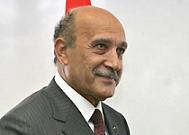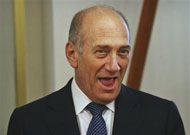On July 16, US President George Bush announced that the US would host a Middle East Peace Conference in the fall. The fall is upon us with many unresolved issues still on the agenda and despite concerted efforts from his Secretary of State, Condoleezza Rice, it just might be a statement President Bush will wish he could retract.
The diminishing importance of this “summit” has cluttered the press to a nauseating degree since its inevitability was confirmed. Rice has attempted to assure skeptics in her seventh trip to the region in a year that the “summit” will be “serious and substantive” with the US having “better things to do than invite people to Annapolis for a photo op”. However, in reality, reaching a viable agreement within the timeframe available, from which all parties can adhere to, is proving to be a monolithic task.
Secretary Rice arrived to the region full of energy and positive rhetoric deeming it “time for the establishment of a Palestinian state”. Nonetheless on Wednesday afternoon, after meeting President Abbas toward the latter stages of her trip, it was Abbas, not Rice, who demonstrated the aforementioned ”Rice” urgency calling upon extensive efforts to be made, reiterating that they “must not waste time” on drafting the document.
The debate on the document is the very place where one can pinpoint Rice’s first contradictions and blips in her political jargon. After all the deliberations, Abbas is still under the impression that all parties are “working hard to formulate a joint document…that defines the fundamental status for a solution of final status issues”. This was after his meeting with Rice. However, although Rice emphasized that the “summit” would not by any means be a final agreement which solves everything, she did hint that a discussion on core issues would be pivotal only later saying that the document “does not have to be detailed in order to be serious and doesn’t have to be detailed to be substantive”. These were the exact opinions of Israeli Prime Minister Ehud Olmert who believed the document should be vague and certainly not a prerequisite. Surely the document must be “detailed” if it concerns final issues; if not, Information Minister Riyad al-Malki has vowed that the Palestinians simply will not attend the “summit”.
Abbas also insists that a timetable be applied post “summit” to “measure our achievements”. Rice’s response was “it’s not certain that a timetable that says we have to complete x by y time is where we want to go.” At this point one could sense an air of uncertainty surrounding proceedings.
Conveniently though, all these problems seemed to be solved on Wednesday night, Rice’s last night in the region, when Olmert agreed over dinner to include final status issues in the document. Suddenly Rice’s trip had turned into a success from the uncertainty of the first few days. She had put the wheels in motion for final status talks between Abbas and Olmert; she had allayed Egyptian fears by reassuring them that the US was not rushing the “summit”; and she had visited Bethlehem, a very spiritual place for her. Rice left declaring that there was “a lot of work to do”, an understatement in itself. Nevertheless, she had managed to salvage her trip, now deemed an encouraging step forward.
The State Secretary admitted her aim was to move this peace process “as rapidly as possible to conclusion” but the spectator must not get caught up in Olmert’s words. The situation is still the same as it was before Olmert and Rice sat down for dinner. Rice must comprehend the complexity of discussing final status issues for both sides, especially within the timeframe. Promising to add final status issues to the agenda is a lot easier than agreeing on and implementing them.
Firstly, Olmert agreed to include final status, not provide possible solutions to the grievances. The US will also not send invitations until the document is decided upon, so subsequently there is still no date. Furthermore, how can the two negotiating teams headed by Ahmad Qurei on the Palestinian side and Tzipi Livni on the Israeli side, hope to break ground on the document when Livni was only appointed as the head of the negotiating committee by Olmert last week, the two teams have only met once and Livni adamantly maintains that Palestinians should not hold high expectations?
One must reflect on the opinion of Israeli journalist Akiva Eldar and agree that both sides are unable to come up with a document that will be “detailed, mutually acceptable, clear and keep them in office”. There are too many contended aspects of final status issues over which neither side is willing to budge.
Abbas explicitly demands a full withdrawal to the 1967 borders. This is a condition stated in the highly debated UNSC Resolution 242. However, even with a border distinction enforced by the UNSC, one must wonder what is to be done about east Jerusalem and the 450,000 Israeli settlers currently residing in West Bank territory. One must also not ignore the 9 meter high, 800 kilometer long Israeli barrier dissecting 8.6% of the West Bank.
Palestinians demand that there is no independent state without east Jerusalem as its capital. The theory of dividing it, leaving Jewish communities to be governed by Israel and Arab communities to be run by Palestinians is simply unfeasible as there are a host (almost a quarter of a million) of Jewish settlers in east Jerusalem. Olmert recently confessed that the legitimacy of areas such as Shufat, al-Sawahra and Walajeh in east Jerusalem must be reevaluated but once again it is a question of Olmert and his words. In a Ha’aretz poll, most Jewish Israelis oppose any negotiation on east Jerusalem, a view shared by the majority of Knesset lawmakers who signed a petition to rescind Olmert’s authority for compromising on Jerusalem. In addition, while Rice was in the region, the Israeli Mayor of Jerusalem announced that he was sponsoring a plan to increase settlement activity in east Jerusalem marketing 20,000 housing units and confiscating 386 dunums of Palestinian land.
There are further troubles with settlements. Abbas has conceded that if a full withdrawal is not possible, he is willing to allow a 2-3% land swap at a 1:1 ratio. In effect, this would mean that Israel could keep 2-3% of the West Bank for settlements but would have to compensate Palestine with 2-3% of Israel for Palestinian refugees or the one million Israeli Arabs currently in Israel. Instead Israel has proposed to pull out of 95% of the West Bank (which doesn’t include all of east Jerusalem and the settlement bypass roads in the West Bank). One could assume, if pushed, that Israel would offer land compensation in a tiny area somewhere in the Negev desert or on sporadic settlements which would be isolated and economically unstable.
While evaluating the settlement problem, it is important to mention the most recent development which also coincided with the US Secretary of State’s visit. Amongst all these meetings professing the message of peace, Israel publicly claimed that it was going to expand the area around the Maaleh Adumin settlement in the so-called E-1 area of east Jerusalem by 3,500 apartments, 10 hotels and a park. It also intends to build a road which would run horizontally across the West Bank from east Jerusalem to the Jordan Valley, dividing the northern West Bank from the south.
Then there is the “right of return” of Palestinian refugees. In a letter from President Bush to Ariel Sharon in 2004, Bush wrote that it was impractical for these refugees to return to their original homes in Israel. As a result, it would be more sensible for them to seek refuge in the West Bank and Gaza. Additionally, the aforementioned Ha’aretz poll showed that 87% of Jewish Israelis refuse to recognize the right for any Palestinian refugee to return. Abbas wants their “right” to be recognized and for a fair solution to be reached over this issue.
These are just an example of the type of concerns conveyed by both sides. Certainly nothing to be resolved “as rapidly as possible to conclusion” just because Olmert has said that final status matters will be on the document. An agreement is still a long way off even with Rice’s assertion that “success will require compromising by both sides”.
There are plenty who question the “summit” such as Saudi Arabia and those who categorically oppose the “summit” such as Iran. But few would have thought that the sternest attack on the “summit” would come from US neo-Conservative Elliot Abrams, Deputy Assistant to the President on the National Security Council of Middle East Affairs, who stated that this whole process is an “idiotic idea”.
One should not have the audacity to presuppose that the “summit” is idiotic – any attempt to seek a solution through diplomacy and dialogue should be commended. Having said this, I must agree with former Israeli Foreign Minister, Ben Ami, who concluded that “everyone wants peace but they don’t want to pay the price. The maximum Olmert can offer falls short of the minimum for the Palestinians”. Olmert will lose his coalition otherwise.
In their meeting with Secretary Rice on Wednesday, Nabil Abu Rdeneh conveyed the reservations in the Palestinian camp, saying the “credibility of the US administration depends on the pressure that it is willing to exert on Israel”.
Olmert may think that he only has to appease the US and the Palestinians for another 14 months or so before a new President is elected to 1600 Pennsylvania Avenue, but as Afif Safieh, head of the PLO Mission in the US eloquently reported to the Jewish Chronicle, although the President is in his “lame duck” phase, “lame ducks can still lay eggs”.
On arrival, Condoleezza Rice was questioned over her commitment to the cause. She doubted whether she could get her “hands any dirtier”. The answer is simple – the US must refuse to permit Israel to continue taking so many obvious liberties such as expanding settlements, the Israeli army’s constant aggressive nature, their uncooperativeness to comply and compromise, imposing more travel restrictions on Palestinians, and arresting more Palestinians while peace talks are ostensibly in motion.
Secretary Rice, in demonstration of her devotion, stated that she would throw everything at peace, “my last ounce of energy and my last moment in office”. The Bush administration has just over a year left. After this, will the Israel / Palestine issue revert back to square one following the inauguration of a new President with a different perspective?











